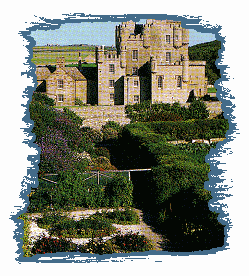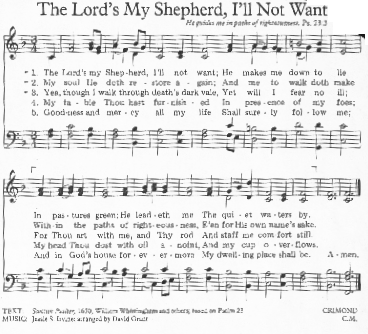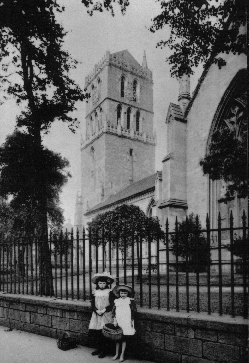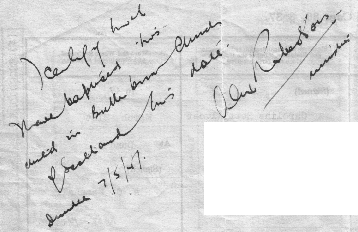| Prayers have always been an important part of my life. I
was baptised by the minister of the Bonnethill Church in our house when I was a baby. That
I don’t recall, but I do remember going across the street to the Sunday School and to
the "cantata" rehearsals for the little musical plays the Church members would
produce with the local children. Highlights of going to Church were the annual Sunday
School picnics to places like Camperdown Park or as far afield as Monifieth and Broughty
Ferry and Carnoustie and Arbroath and, of course, the Christmas parties when Santa Claus
would always bring the most wonderful presents with him. Worship services were a part of
going to school and being educated. Our music lessons included practicing hymns for
regular school assemblies and it was taken for granted that our schools had a minister
assigned to us for his appearance on special occasions. I can’t remember if we had
frequent services in Primary School, but I do remember weekly 15 minute assemblies at my
secondary school, Harris Academy, where we sang without texts one of the better known
hymn, (during which I know I shuffled my feet and talked to my friends), announcements
were given, and the school minister said a prayer and gave us his weekly blessing which
began "May the grace of God go with you," and ended with a reference to the Holy
Trinity.
I don’t remember my mother and grandmother being particularly religious people.
End of primary school years always included a service in the Church as part of the prize
giving ceremonies and secondary school year endings always had the religious service in
the gymn. I remember my mother coming to those when she could. And I know they came to the
cantatas I was involved in, especially "Princess Chrysanthemum" when I was about
8 or 9 and had a leading part as the ‘major domo.’ (And I still remember loving
the part for the words I had to say, but hating the one song I had to sing because I
didn’t believe I was a singer! Still don’t, as a matter of fact.)
But I can’t remember a time when I didn’t believe in God. So, without going
regularly to Church, or having family prayers in our home, and having lost my great
grandmother’s family bible before it was my turn on earth, and without having family
prayers in our home or any outward evidences or displays of religiosity, somehow God was a
part of the nature of our lives. My mother must have taught me to pray. Who else could
have? My mother must have taught me to believe. Who else should have?
There is so much in Scottish song, poetry, story and our traditions that reflects on
the nature of God and leaves a blessing behind. I hope you’ll find some of that in
this scrapbook.

The Celtic Cross at Flora McDonald’s grave, Isle of Skye
THE 23rd PSALM IN SCOTS
The Lord is my Shepherd; in nocht am I
wantin’,
In the haughs o’ green girss does He mak’ me lie doon;
While mony puir straiglers are bleatin’ and pantin’
By saft-flowin; burnies He leads me at noon.
When aince I had strayed far awa’ in the
bracken,
And daidled till gloamin’ cam’ ower a’ the hills,
Nae dribble o’ water my sair drooth to slacken,
And dark grow’d the nicht wi’ its haars and its chills.
Awa’ frae the fauld, strayin’
fit-sair and weary,
I thoucht I had naethin’ to dae but to dee;
He sacht me and fand me in mountain hechts dreary;
He gangs by fell paths which He kens best for me.
And noo, for His name’s sake, I’m
dune wi’ a’ fearin’,
Though cloods may aft gaither and soughin’ win’s blaw;
"Hoo this?" or "Hoo that?" – oh, prevent me frae
speirin’;
His wull is aye best, and I daurna say na.
The valley o’ death winna fleg me to
tread it,
Though awfu’ the darkness, I weel can foresee;
Wi’ His rod and His staff He wull help me to tread it,
And then wull its shadows, sae gruesome, a’ flee.
Forfochen, in presence o’ foes that
surroond me,
My Shepherd a table wi’ denties has spread;
The thyme and the myrtle blaw fragrant aroond me –
He brims a fu’ cup and poors oil on my head.
Surely guidness and mercy, despite a’ my
roamin’,
Wull gang wi’ me doon to the brink o’ the river;
Ayont it, nae mair o’ the eerie and gloamin’ –
I wull bide in the hame o’ My Faither for ever. |
(Newspaper Clipping Comments)
William Jenkins, Vale of Leven, writes: - For the benefit of fellow readers of
"People’s Journal," and to prevent the following version in Scots of the
23rd Psalm from disappearing for ever, I hope you will use the enclosed. I took it from
the lips of an aged farm labourer in Midlothian 10 years ago.
The Lord God Made Them All …

Castle of Mey, Caithness
|
All things bright and beautiful,
All creatures great and small,
All things wise and wonderful,
The Lord God made them all.
Each little flower that opens,
Each little bird that sings,
He made their glowing colours,
He made their tiny wings.
The tall trees in the greenwood,
The meadows where we play,
The rushes by the water,
We gather every day –
He gave us eyes to see them,
And lips that we might tell
How great is God Almighty,
Who has made all things well.
(Cecil Frances Alexander) |

Go, little book, and wish to
all
Flowers in the garden,
Meat in the hall,
A bin of wine, a spice of wit,
A house with lawns enclosing it, |
A living river by the door,
A nightingale in the sycamore!
(ENVOY, by Robert Louis Stevenson, 1850-1894) |
To this day, I often think of the story my mother told me,
often enough obviously, that I still remember, of the two angels who live in Heaven (as
opposed to the other angels who live elsewhere!)
These angels are both writing in very large books everything
I do. One angel who rights in the book of good things I do. And, are you surprised(?) the
other writes in the book of bad things I do. Lovingly, my mother told me I needed to be
keeping the writer of the good book the busier angel.
The time will come, she taught me, when I will go before God
and be judged out of those two books. I never felt afraid. Instead, thanks to my
mother’s teaching of her understanding of love and righteousness, I felt empowered,
responsible for my own actions, and believed I would be able, some day in the hopefully
very far future, to account positively for my life.
I wonder if I have had the same success with my children as I
think my mother had with me? In my life, at work, and with my church activities I seem to
act as a "behavioralist" with a perspective of personal responsibility, and a
belief that God and those who love me want me to find success.
But "success" is nothing more than being happy and
making right choices.
I remember at Miss Angus’ elocution, I must have been
between 10 and 12, I was the prompter for a short, very short, play because we performed
it at one of her recitals. The theme was a spirit leaving Heaven, finding her way to
earth, and being lost and afraid about what challenges were waiting. I remember the
opening lines as the spirit entered from the wings. "Lost. I am lost," she said.
This spirit met up with two angels, one who told her he would make life easy for her but
he wanted rewards from her throughout her life and beyond. The other came second, and
promised that she would help the spirit make choices that would give her happiness,
perhaps not always in the life on earth that awaited, but definitely later.
The little play concluded with the spirit going on her
journey to Earth with a sense of comfort and faith that she would be protected and guided,
if she listened to spiritual promptings when making her life choices.
Later, when I was fourteen, I was introduced to
"Mormonism". I think I became a member of the Church of Jesus Christ of
Latter-day Saints in part because of this early spiritual foundation of belief affirming
God’s love, angels who want to guide us, the gift of choice over the life paths we
take, rewards and consequences and self responsibility over our selves (and I mean to put
this in two separate words) and a Father who wants us home with him in Heaven at our
journey’s end.
I learned a poem once at Miss Angus’ about two angels
and another about candlesticks and choices. I hope you enjoy these poems. Perhaps you can
imagine the candlesticks on an alter in a mediaeval church, like St. Mary’s in
Dundee, whose Old Steeple still stands.
And, to end on a lighter note, I’ll give you "The
Minister Comes to Tea," a Yankee poem I learned to practice dialects – this time
American!
The Gift of Tritemus
Tritemis of Herbipilious one day,
While kneeling at the altar’s foot to pray,
Alone with God, as was his pious choice,
Heard from without a miserable voice.
A sound which seemed of all sad things to tell,
As of a lost soul crying out of Hell.
The Abbot paused, this chain whereby
His thoughts went upward broken by
That lay, and looking from the casement saw below
A wretched, woman with gray hair aflow,
And withered hands held up to him, who cried
For alms as one who might not be denied.
She cried, "For thee, dear love of Him
who gave
His life for ours, my child from bondage save.
My beautiful, brave, first-born chained with slaves
In the Moor’s galley, where the sun’s smit waves
Lap by the white walls of Tunis."
"What I can I give," Tritemis answered,
My prayers are with you always."
"Oh, man of God," she cried, for grief had made her bold,
"Mock me not thus, I ask not prayers, but gold.
Words shall not save him. Alms alone suffice,
Even while I speak, perchance my first born dies."
"Woman," Tritemis answered,
"From our doors none go unfed.
Hence are we always poor.
One single solda is our only store.
Thou hast our prayers. What can we give thee more?"
"Give me," she said,
"The silver candlesticks on either side of the that crucifix.
God may well spare the money therein sped,
Or he can give you golden ones instead."
"Woman," Tritemus answered,
"even as thy word,
So be it." Oh, most gracious God,
Who lovest mercy more than sacrifice,
Forgive me if one human soul I prize
Above the gifts upon your alter plied.
"Take what thou askest and redeem thy child."
But his hand trembled as the holy alms
He placed within the beggar’s eager palms.
And as she vanished down the linden shade,
He bowed his head and for forgiveness prayed.
So the day passed, and when the twilight came,
He woke to find the Chapel all aflame.
And dumb with grateful wonder to behold,
Upon the alter, candlesticks of gold!

This is a postcard of the Old Steeple, part of St Mary’s
Church,
in Dundee. History has it that during the revolutionary
period, (Wars of the Roses, not American) Cromwell’s General,
Monk, sacked Dundee and burned alive the men, women and
children who had crowded into the Steeple for sanctuary.
The Two Angels
God called the nearest angels
Who dwell with him above.
The tenderest one was Pity,
The dearest one was Love."Arise,"
he said, "my angels,
A wail of woe and sin
Steals through the gates of Heaven
And saddens all within.
My harps take up the mournful strain
That from a lost world swells.
The smoke of torment clouds the light
And blights the asphodels.
Fly downward to that underworld
And on its souls of pain
Let Love drop smiles like sunshine
And Pity tears like rain." |
Two faces bowed before that throne,
Veiled in their golden hair.
Two angels traveled swiftly down
The dark abyss of air.The way was
strange. The flight was long,
At last the angels came
Where swung the lost and netherworld
Red wrapped in rayless flame.
There Pity, shuddering, wept.
But Love, with faith too strong for fear
Took heart from God’s almightiness
And smiled a smile of cheer.
And, lo, that tear of Pity
Quenched the flame whereon it fell,
And with the sunshine of Love’s smile,
Hope entered into Hell. |
Oh, they’ve swept the parlor carpet, and
they’ve dusted every chair.
An’ they’ve got the tidies hangin’ just exactly on the square.
And the whatnots fixed up lovely, and the mats have all been beat,
And the pantry’s brimming over with the bully things to eat.
Sis has got her Sunday dress on, an’ she’s frizzin up her bangs.
Ma’s got her best alpacky and she’s askin’ how it hangs.
Pa has shaved as slick as can be, and I’m rigged way up in G
And it’s all because we’re goin’ to have the minister to tea.
Oh, the table’s fixed up lovely wi’
the gilt edged chiny set.
And we’ll use the silver teapot and the comp’ny spoons you bet.
And we’re going to have some fruitcake and some thimbleberry jam,
And riz biscuits and some doughnuts and some chicken and some ham.
Ma, she’ll polergize like fury and say everything is bad,
And "sic awful luck wi’ cookin’" she is sure she never had.
But of course she’s only bluffin’ for it’s prime as prime can be
And she’s only talking that way, cause the minister’s to tea.
Everybody is a-smiling and as good as ever
was.
Pa won’t growl about the vittles as he generally does.
And he’ll ask me, "Would I like another piece o’ pie," but
sho’,
That of course is only manners and I’m supposed to answer, "No."
Sis’ll talk about the Church work and about the Sunday School,
Ma’ll tell how she liked the sermon that was on the Golden Rule.
And if I upset my tumbler, they won’t say a word to me.
Yes, a girl can eat in comfort with the minister to tea.
Say, a minister you’d reckon’d never
say what wasn’t true.
But that isn’t so with ours, and I just can prove it too.
‘Cause when Sis plays the organ so it makes ye want to die
Why, he sits and says, "It’s lovely," and that to me’s a lie!
But I like him all the same and I only wish he’d stay
At our house, for good and always and eat with us each day.
Only think of having goodies every evening – Jiminee!
And I’d never get a scolding, with the minister to tea.
 |
When I was a baby, I was so sick with
pneumonia and measles, my mother told me that I wasn’t supposed to live. She and my
grandmother had "great big fires in the grate" to keep me warm, and called the
minister in from the church across the street to baptize me, quickly, so my little spirit
would be taken care of. As was the tradition, he certified me as baptized into the Church
of Scotland on the back of my birth certificate. Now, since I’m a baptized Presbyterian, I suppose it’ll be all my
own fault if I go to hell, and not poor Eve’s for eating the apple and
"tempting" her less astute husband, Adam! |
|

